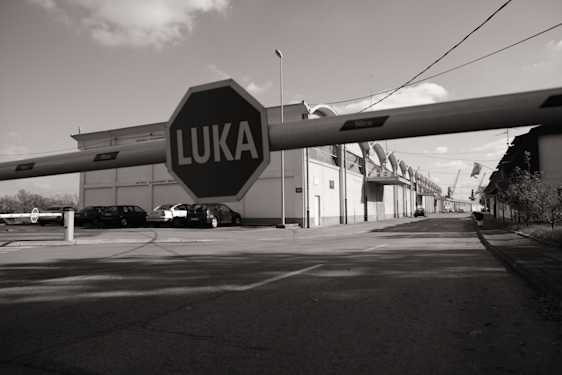
Luka - a new primitivism for a new millennium
Hodophiles is pleased to present an extract from the chapter 'A New Naivety' of Ian Bancroft’s new novel, Luka, which is inspired by the musings of L., a naive artist. Luka tells of lives scarred by wars past and present, whose main characters - L., U., K., and A. - are confronted with the dilemmas of truth and justice, and the struggle to reconcile and forgive. It is inspired by Bosnia and Herzegovina and the wars in the former Yugoslavia.
A New Primitivism for a New Millennium
I awoke this morning before the rising of the sun, the copper-colour streetlights reverberating and distressing the cobbled stones peering out from beneath a layer of tarmac. The streets were empty, except for a band of graffiti ‘artists’ daubing the walls with their so-called wisdom. They think they are colouring the city, painting over its dreariness, but all they bring is kitsch and cliché. By nightfall, their work will have been defaced, though I will take no credit for it. This hand of mine is my ultimate alibi.
Pilloried and parodied, for too long the people from the countryside have been shunned and condescended to. Their habits and traditions have been castigated by those who barely understood them or cared to learn. These concrete jungles, with their condescending attitudes, these places of sheer disrespect, will feel the wrath of the peasantry.
We, naive artists of the world, are scarecrows deterring the vultures from our freshly cast seed and striking fear into the hearts of those who choose not to understand us – or worse, ignore us. So let us now praise famous men of the valleys!
With their calluses, scars, cuts and bruises, these hands distinguish us from those who have never done a hard day’s work. Those who profit from our back-breaking toil yet spit in the face of our existence. We are the rural poor on whom the urban rich rely. Watch with sheer delight the senseless panic when we withhold our labour and strangle their shelves. See how they come begging when their pathetic roof-top gardens fail to sprout. These hands will become a source of pride, not inferiority, a source of envy, not derision.
We must capture how they came here not of their own volition but were wrestled from their lands, those very lands that they have nurtured for centuries. Let their sorrow cut through undiminished.
And to quote a famous warning, a cry for caution – ‘do you know what the trees say when the axe comes to the forest? Look! The handle is one of us!’ We will not be deceived by those who claim to be from amongst us but who would betray us at the very first opportunity.
We will obliterate urban cultures with their supposed melting pots of plastic tolerance. We will paint the cities adjusted to our ways, the ways of the
countryside! Plough the bypasses and plant rows of sunflowers. Let nature repossess the derelict properties and their crumbling facades. Capture nights without light, save the gleam of the moon and constellations of stars. Decapitate the skyscrapers and extend the horizon towards infinity.
Naivety! A new naivety! A naivety that will swarm from the countryside and its villages into the towns and cities, bringing with it customs and traditions that will not be stifled by so-called ‘modernity.’ We must remain pure and authentic and not be influenced by flattery and temptation. We will not allow the advertisers and their conspirators to exploit our novelties or appropriate our ways.
It is a historical imperative that we infiltrate the very forces of modernization to deter them from destroying our way of life through mechanisation and speculation. We will make them drink the waters poisoned by pesticides and spray them with fertilisers until their skin turns red. We will confront them with those maimed by machinery. They will not sleep easily.
Let us be the unpaid agitators!
We must also contend with those who claim to empathise with our plight. We don’t need their sympathy! We don’t need their support! We must confront them and their hypocrisy! Our solidarity must remain fierce!
Though deprived of one of my hands – the one with which I once painted - I offer my remaining good one. And more, a vision that has bewitched me through these solitary days, days in which I thought there might be no tomorrow.
My army of painters! Don’t let your judgement be swayed by the tricks and illuminations of so-called ‘contemporary art’. Resist the buzz of the neon lights and the platitudes of pixels. Shun slick production methods that deceive and entrance. Film and video are for the wretched.
All formal education is deceitful and archaic, driven by institutionalised conservatives and their compromised morals.
The content of our work is inextricably tied to its form. Our means must remain modest, grounded, and earthly. Whatever you can scavenge and recycle, whatever we can extract from nature.
And the subjects themselves must become the artists. To grab paintbrushes and articulate their world through their own eyes. Such artistic tendencies need not be formally nurtured but given the means to ripen. Were contemporary artists to go on strike, then the world would never notice. When artists lay down their paintbrushes, then people will starve.
The Manifesto of a new naivety:
We will revel in our love of the rituals, the heritage and the habits of our forefathers, and the realms of myths, superstitions, and magic.
The essential elements of our project will be perseverance, patience, and humility. Time is on our side.
We will exalt rootedness as the basis for all our art, that time-honoured connection to our lands and all they have nurtured. We refute the ceaseless mobilisation of humankind for the ends of profit and war over the frugality of our needs and our sensory ties with nature.
We declare that the splendour of our world has been enriched by a renewed beauty – that of dependence on one another without question or hesitation. Governed by the rhythm of the winds and the hum of the rivers, we will remain faithful to the callings of our earth. In unison, we will harness the full potential beneath our feet, not like those who seek to extract and destroy but as those who nurture and create. Only naive art is profound.
We want to sing of those men and women who make love in the fields to know one another and the land better.
The artist must increase the potential of the collective of the peasantry to relish in its structures and derive daily inspiration for future masterpieces.
Magnificence exists not in the manufactured divides and oppositions of the urban elites but in the existential struggle born of drought and frosts, floods and famine. Our works of art, our imaginations, are obliged to capture the heroism of this battle.
We must never forget that the abyss of violence and horror has affected our people the most, not just in recent years but over the decades and centuries. It can return without warning. We have lived in the stagnant time of nationalism for too long. Only the bond of dedication to the land can transcend all other distinctions.
We want to glorify peace – the only cure for the world - save where we have the right to redeem ourselves through revenge, which is permitted only by our hands and against those who directly caused us harm. Vengeance cannot be substituted or sold off to mercenaries.
We will look into the past for those habits and rituals that once bound us together, those commonalities that have been wrested away or entirely neglected.
We will demolish the museums and libraries of wealthy benefactors and display our work only in those places accessible to all those who overcome their cowardice to support us in liberating our art. Their contempt will be nullified.
Beauty exists only in sincerity – of the subject and the form. One cannot be sincere unless both are sincere.
We reject proportionality, the muting of colours, and the sharpening of edges. Balance and harmony are for those devoid of any semblance of spirit or creativity.
We denounce representations by those who have never felt the soil between their fingertips, who’ve never shuddered as the shards of wind race across the plains. You cannot paint from a distance.
This manifesto establishes our New Naivety with pride and confidence. These words – which will be spoken in my voice – will echo throughout the villages of our land, and our brothers and sisters who have been forced
from our lands against their will. Though they are gone, they are not forgotten! Our arms remain open to embrace their return!
Our oral traditions mean we do not need museums that trample upon our traditions and negate our heritage!
Museums: slaughterhouses! Identical in the stunting of the mind, where only meat and bones come out. They have ignored us, the only authentic voices. They project only the supposedly sophisticated and complicated, works that they deem us too simple and foolish to understand.
Those sites where people were interned and tortured – me included, from which I will never recover – must not simply be returned to their previous purpose. They must not be afforded the veil of invisibility nor the cloak of silence. We must, and we will mark them as we so wish, for they are already stained with the blood of our victims. And those who cleanse our efforts will only provoke us to leave a more permanent mark.
If someone makes only an annual, symbolic pilgrimage to the countryside, then we will use all resources at our disposal to prevent them! We will barricade the roads with our tractors and release our sheep to roam the highways. Only the sincere and dedicated will be permitted to celebrate our fields and pastures, our valleys and mountains, our rivers and streams.
For too long, we have depended upon outsiders to resolve our problems, to articulate solutions in words and phrases we don’t understand. Even if they didn’t want to rule over us, we would still give ourselves freely. It is a sickness, and we are in denial.
Ian Bancroft is a writer based in the former Yugoslavia. ‘Luka’ can be purchased by clicking on the following link.
Ian is a writer based in the Balkans. He is the author of 'Dragon's Teeth - Tales from North Kosovo' and 'Luka'. Follow Ian on Twitter @bancroftian.
Currently in: Belgrade, Serbia — @bancroftian
